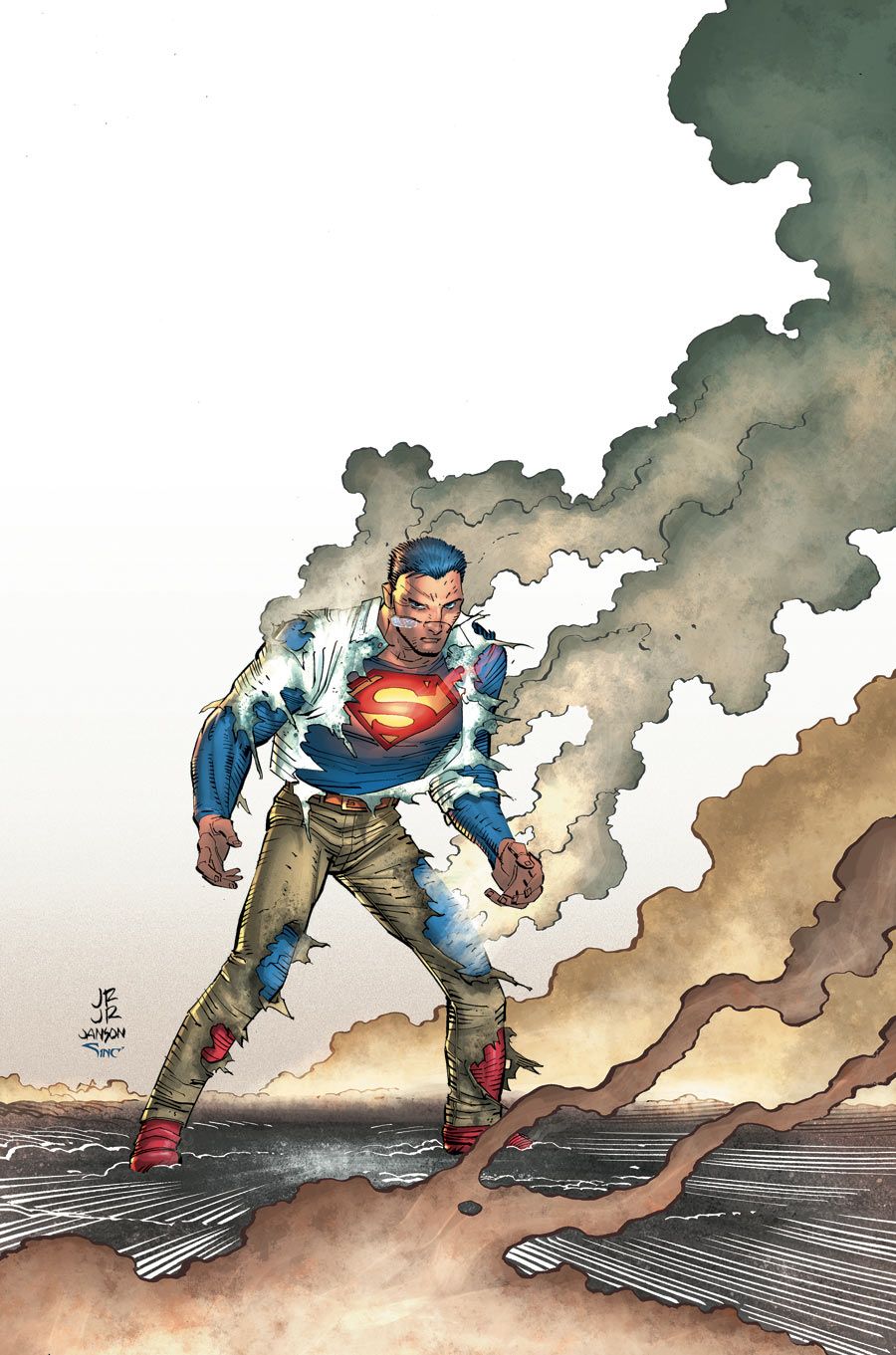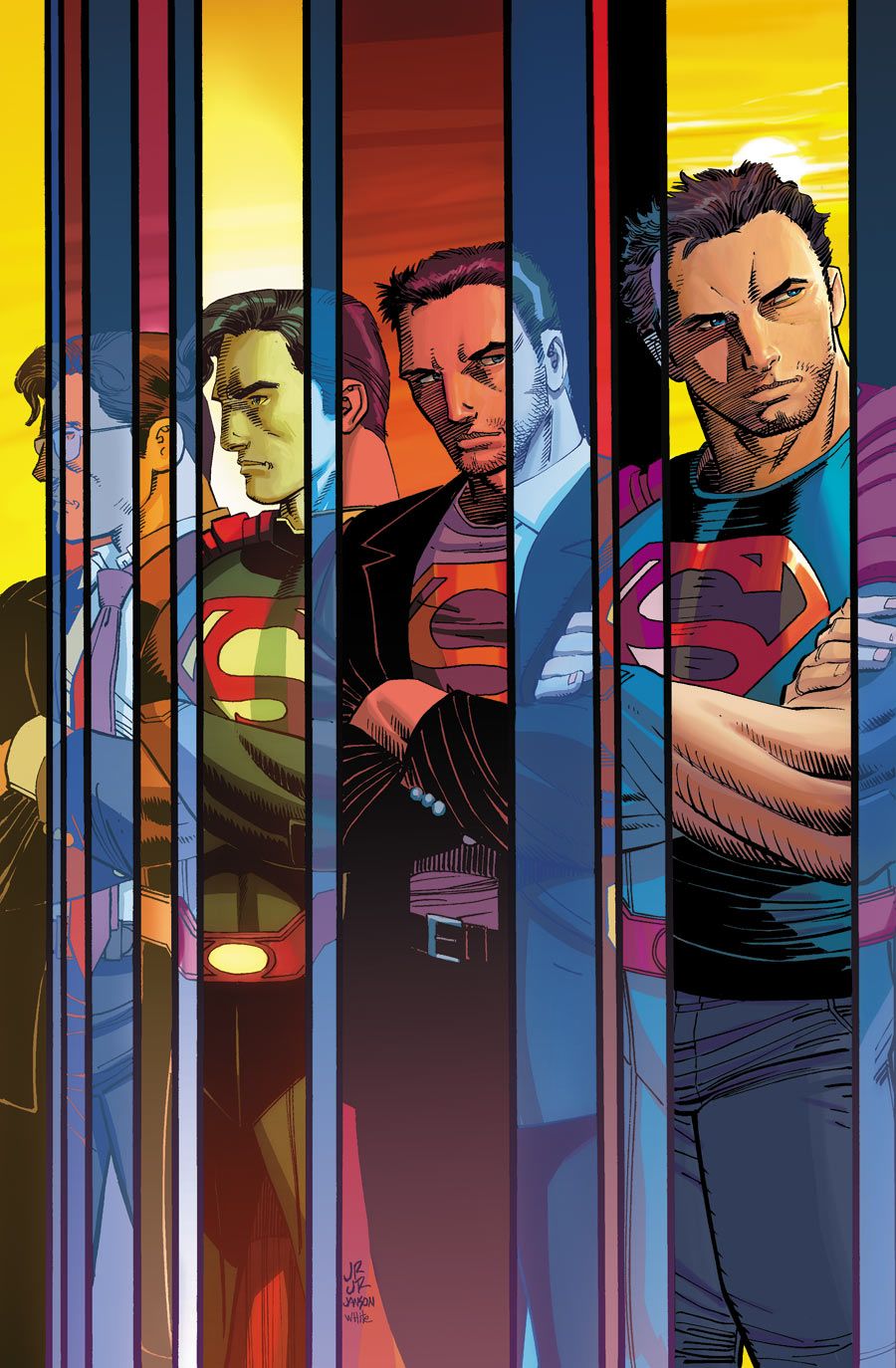The first arc of Eisner Award winner Gene Luen Yang and living legend John Romita, Jr.'s "Superman" took flight today. However, rather than presenting readers with the next chapter of "Truth," the creative team is telling the story behind the story running through DC Comics' Superman-led titles.
At the heart of the hero's new status quo lies the fact that Lois Lane has revealed to the world that the Man of Steel and Clark Kent are one and the same. In "Superman," Yang and Romita, Jr. will show how the Pulitzer Prize-winning reporter discovered the secret, and why it makes perfect sense that she shared it with, well, everyone.
RELATED: Greg Pak, Aaron Kuder Uncover the "Truth" In "Action Comics"
Yang and Romita shared with CBR News that the arc is partially inspired by Edward Snowden and the WikiLeaks scandal, illustrating how the slow burn of the truth is vitally relevant to today's storytellers. The writer also explained that no one is safe from the storytellers, and that the faceless/voiceless character leaving Clark texts with anonymous news tips should be considered dangerous for reasons even beyond the obvious.
CBR News: Lois Lane plays a major role in "Superman" #41 and will be heavily featured in this current cross-title arc, "Truth." She's a comic book character that's as old as Superman. She has no superpowers, no secret identity and no secret origin. Why has Lois Lane endured for 75-plus years? What makes her such a special comic book character?
Gene Yang: Lois Lane is an amazing character. I think, as you stated, one of the things most appealing about her is that while she has no powers, she is able to hold her own against Superman -- the most powerful being on the planet. In part of preparation for writing this series, I went back and read a lot of those early "Superman" comics from the late 1930s and early 1940s, and Lois Lane's tenacity and hunger for knowledge, and her courage has been there from the very beginning. It was not a response to any of the social changes between the 1940s and now. All of the buildings of who she is have always been there since the beginning. She was well ahead of her time when she was created, and that's what makes her relevant today.
John Romita, Jr.: I think she's annoying. [Laughs] She has the exact same hair and color as Clark Kent. I draw them in the same panel, and I'm screaming because I can't change her hair.
Honestly though, yes, she's a strong character. But if you overthink it and do the exact same thing that people want, that's bad. Now that's it's established that she's a strong character, there is nothing wrong with doing something different with her, as long as you don't tie her to the railroad tracks.
Personally, I think that she shouldn't get into any kind of romantic relationship with Clark Kent ever again. Ever. It's just too damn easy. Finding out who he is should irritate [her] to no end. I think, to make her different, you have to make her completely independent of any cliche ever written about this female character, because she's original female heroine. And there is no way of doing anything original with her unless you take what everybody else expects her to do and don't do it. If she decides to be a bitch, let her be a bitch. That's her prerogative, because Clark is a doofus. [Laughs] She should call him an "asshole," when she finds out he's Superman. And there should be no romantic involvement. She should also be running the Daily Planet. In the 1940s, sure, she could have said, "Ooh. You're my big, strong superhero." But screw that. We don't do that anymore. It's time for her to say, "You lied to me, you bastard. I should have known. And how come I couldn't tell it was you with your glasses on?" [Laughs] "I'm so stupid. You look exactly the same."
She should have known 25 years ago. I think we should throw everything out the window and change her hair slightly. We're actually going to change her hair in a couple of issues, so we won't have to worry about that anymore.
Yang & Romita, Jr. Discuss the "Truth" Behind Superman's Big Change
As a fan, I've known Lois so long that it actually hurts that she's the one to reveal the truth of who Clark Kent/Superman is. I feel betrayed, but based on what you're saying, it's actually exactly what she would do if Lois is truly being Lois.
Yang: When we expose our friends' deepest secrets, and it happens, there's a complexity of motives that comes with that. We're hoping that when folks are reading the issues, they'll see that complexity and understand Lois' motives.
One of the most awesome things about the reboot of the DC Universe is that we get to see that Lois can stand on her own as a character without the romantic involvement of Clark. Because there are these two attractive people, there is an underlying tension there, but that's not what defines them.
Romita: She should find somebody else, and Clark should get jealous -- and that's the way it should be. She should have no interest in Clark. Everybody assumes that these two characters are going to get together, and that's counter to what I think that we should be doing.
We talked about Lois, but what about Superman's pal, Jimmy Olsen? How does he rate, and why does he get the lion's share of Clark's trust?
Yang: Jimmy Olsen is basically an everyman. In some ways, he almost serves as a foil for Clark. He's not as street-wise as some of the superhero characters, at least not yet, and he's even a little bit more naïve than Clark. One of the things that I love most about having Jimmy in the book is that you get to play with a friendship between two guys. A lot of guy relationships are just dumb -- full of dumb jokes and telling stories about goofy things that just happened. But underneath that goofiness is a genuine and deep caring for one another -- a true loyalty. That's Clark and Jimmy.
Romita: I always thought that he was the goofy sidekick, and I think giving him this secret resets the character. People will change once they have that kind of secret, once they have that kind of information. It could turn somebody from a silly teenager or a twenty-something into a young man, and I think that's what this does. Listen, I was a moron until I was 40. [Laughs] Having this kind of information could mess him up. He could fall back into his immaturity, but it also causes a great jump in his personality.
In this first issue of the new arc, someone is anonymously texting Clark tips that he's using to his benefit, both as Clark and Superman. Are you ready to tell us who's sending the texts?
Yang: [Laughs] You're going to have to keep reading, but I'll tell you, the whole texting phenomenon is a Superman take on a lot of what's happening in the modern world. There is the whole Edward Snowden thing and WikiLeaks and just the fact that most powerful people in the world are now not powerful enough to keep their secrets. The character behind those texts is our way of playing around with that dynamic.
Can you tell us if we've seen the character yet in the pages of "Superman," or at least when we might see him or her?
Yang: That's one of the challenges of modern storytelling. Storytelling is all about information flow. You want to give just the right information at the right time so you can ride that really fine line between being confusing and being intriguing. That's the challenge of every single book that I write. How do I ride that fine line? Luckily, on this book, even if don't ride that fine line well, folks will still read it because it's pretty and so very well drawn. Honestly, writing this story has been immensely fun and an amazing learning experience -- and it's also been a huge challenge.
Romita: Thanks, Gene. That's very complimentary. Storytelling, to me, is the most important part of the character. The visuals are what they are because this is Superman. We know what he is, so we can't do anything that's a surprise -- although we did give him a new power, but it's within his realm. But honestly, good storytelling covers up a lot of mistakes, especially as an artist. Trust me.
John, you've already drawn Superman/Clark for an extended arc with Geoff Johns, but Gene, you're just a few months into writing your run. Has Superman surprised you?
Yang: Because he's such a long-standing character and he has such a history behind him and he's gone through so many different incarnations and iterations, there is always something in his past that you can draw inspiration from. That's what surprises me about him. He's pretty flexible. He's not just everybody's favorite uncle. He's not just a boy scout. You can actually bend pretty far from that and still stay true to some piece of who he was in the past.
"Superman" #41 by Gene Yang and John Romita, Jr. is available now.









